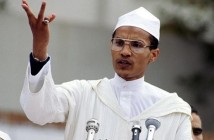Since the beginning of the Arab Spring, pressure has been mounting on many leaders in the Maghrebian countries and beyond to reform their political and socio-economic systems. We have witnessed different outcomes.
In Tunisia, ex President Ben Ali fled his country to seek asylum in Saudi Arabia which is the second home of several notorious dictators including the dreadful Idi Amin of Uganda. Ben Ali and his wife Leila were tried by a Tunisian court in absentia and sentenced to 35years of imprisonment and a fine of £65.6 m.
Hosni Mubarak, often called the modern pharaoh of Egypt, and his wife Suzanne are now living in disgrace and are awaiting trial by an Egyptian court on charges of giving instructions to kill innocent civilians during the anti-government protests and also about their unexplained wealth.
To appease the protesters, King Mohammed IV of Morocco organised a referendum last week on a revised constitution providing for devolution of some of his powers to Parliament and the Government. The constitution was overwhelmed approved. However, the radicals are still not happy and the King knows he will have to live under the Arab Spring pressure for some more time.
In Yemen after several months of violent street demonstrations calling for President Abdullah Saleh to quit power, Saleh was severely wounded in a bomb blast. He was whisked away to Saudi Arabia for urgent medical treatment. He is still there.
Likewise, the situation in Syria is deteriorating day by day. Many western Governments have condemned President Bashar al Assad over the killing of his opponents and civilians but his terrifying army continues to crush them with the same degree of acid violence used by his father. The young President had originally a number of good cards to transform the institutions of his country in line with the aspirations of the Syrian people, but he soon fell prey to the ultra conservatives of the Ba’ath Party and the overlords of the army. He has now become a potential candidate for the ICC.
What is the ICC? The Rome Statute of the International Criminal Court became legally in force in 2002. The ICC has jurisdiction over the crimes of genocide, crimes against humanity, war crimes and the crimes of aggression. Among the countries which have not signed and ratified the treaty are the US, India, China, Sudan and Israel. Even if a country is not a state party to the ICC, its nationals can be prosecuted. Furthermore, the Statute provides that when a case is referred to the ICC by the UN Security Council all UN member states are obliged to cooperate.
By any stretch of the imagination, no one could have predicted the dramatic situation in which Libyans find themselves today. Gaddafi does not intend to relinquish power nor does he want to leave his country. Libya is in the throes of a civil war. Benghazi, the second largest city has its own rulers and the National Transitional Council based there is recognised as a valid interlocutor by France and other countries. The Council says it is ready to take control of the whole country. Holed up in Tripoli which is regularly bombed by NATO airplanes, Gaddafi has ordered his army and henchmen to quell the rebellion by using unimaginable means of terror. In so doing, he has committed crimes against his own people.
Having gathered enough evidence on Gaddafi’s exactions, the ICC has issued a warrant for his trial at The Hague. President Omar al Bashir of Sudan robbed Gaddafi of the gold medal when the ICC issued the former with an arrest warrant in 2009 for alleged war crimes and crimes against humanity in Darfur. Both the Sudanese and Libyan cases were referred to the ICC by UN Security Council resolutions. A defiant al Bashir simply ignored the warrant. He was allowed by the AU to attend its summits and last week al Bashir went on an official visit to China which is a permanent member of the UN Security Council. Crazy world, would you say?
When I learned of the historic decision of the ICC to indict al Bashir on 4th March 2009, I was about to attend a local meeting on the dramatic plight of the Tamils in Sri Lanka. The Sri Lankan army under the orders of President Mahindra Rajapaksa deliberately and cold bloodedly killed thousands of Tamil civilians in the war zones. I proposed at that meeting that a team of Mauritian jurists should work with international jurists to gather evidence to prove that Rajapaksa, like al Bashir, had in fact committed war crimes and crimes against humanity.
I am comforted that the UN, the International Association of Jurists and international media have released reports and documentary films on the abominable atrocities perpetrated by the Sri Lankan army against the Tamil civilians. The reports also mention the crimes committed by the Tamil rebel leader, Prabakaran. However he committed suicide and cannot face justice. But Rajapaksa is alive and still in power. He belongs to all the same club as al Bashir, al Assad and Gaddafi and should answer for his crimes . The findings of the UN Expert Panel Report released in April 2011 is damming for him. Here is a little extract.
‘Specifically, the Panel found credible allegations associated with the final stages of the war. Between September 2008 and 19th May 2009, the Sri Lanka army advanced its military campaign into Vanni using large scale and widespread shelling causing large numbers of civilian deaths. The Government shelled on a large scale in three consecutive No Fire Zones where it had encouraged the civilian population to concentrate even after indicating that it would cease the use of heavy weapons’. Tens of thousands lost their lives, many of whom died anonymously in the carnage of the final few days.’
It is high time that Rajapaksa appears on the arrest list of the ICC. I have just learned that a US Federal Court in Washington issued a summons for Mahindra Rajapaksa, linked with civil cases filed under The Hague Convention by relatives of Tamils for extra judicial killings.
The ICC arrest warrant is one thing, but the implementation of the warrant is the harder nut to crack. The ICC deserves more support and cooperation from Governments and the International Community to fulfil its tremendous mission of bringing to justice Government and military leaders turned into wild criminals. Let us hope that all peace loving nations will stand closely by the ICC each time it is confronted with a member of the infamous club of despicable rulers.
http://www.defimedia.info/blogs/245/Who-is-next-on-the-list-of-the-International-Criminal-Court.html






